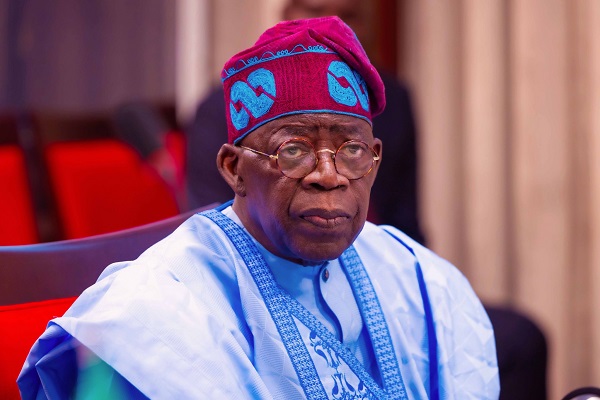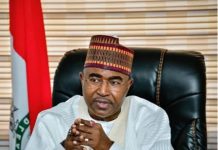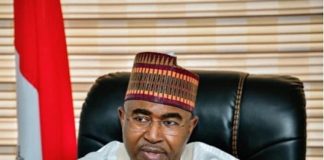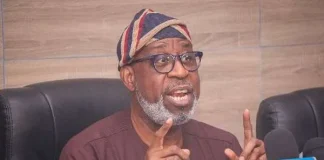🌿 Ruzu Non-Alcoholic Herbal Bitters
Ruzu Non-Alcoholic Herbal Bitters is a natural health supplement specially formulated to:
- ✅ Promote general wellness
- ✅ Detoxify the body
- ✅ Support the treatment of various ailments
Made from a powerful blend of 100% organic and medicinal herbs, Ruzu is completely alcohol-free, making it ideal for:
- 👪 All age groups
- 🌱 Health-conscious individuals
- 🌿 Anyone seeking non-alcoholic herbal remedies
Whether you're looking to boost your vitality, cleanse your system, or support healing the natural way, Ruzu Bitters offers a trusted herbal solution.
The President stated that his primary goals from the beginning, as outlined in the Renewed Hope Agenda, were to address economic instability, enhance national security, decrease corruption, reform governance, and elevate Nigerians out of poverty.
The President awarded himself a passing mark, stating, “We have stabilised our economy and are now better positioned for growth and prepared to withstand global shocks.
„Die Inflation hat begonnen, sich zu entspannen, wobei die Preise für Reis und andere Grundnahrungsmittel gesunken sind; the oil and gas industry is bouncing back; In 2025, rig counts increased by more than 400% compared to 2021, and commitments for over $8 billion in new investments have been made.
“As we move into 2025, we continue to meet our fiscal targets; gross proceeds per barrel from crude oil are largely in line with our forecasts as we increase our production ramp-up efforts.”
He stated that the fiscal deficit of the country has significantly decreased from 5.4% of GDP in 2023 to 3.0% in 2024.
“We accomplished this by enhancing revenue generation and increasing transparency in government finances; we generated over N6 trillion in revenue during Q1 of this year.
“We have stopped Ways & Means financing, which has significantly contributed to high and persistent inflation.
“The NNPC, freed from the weight of unmanageable fuel subsidies, has become a net contributor to the Federation Account. Additionally, we are ensuring fuel supply security through domestic refining.”
He stressed that the country’s debt situation was getting better.
“Although the revaluation of foreign exchange caused our debt-to-GDP ratio to rise to approximately 53 percent, our debt service-to-revenue ratio fell from almost 100 percent in 2022 to below 40 percent by 2024.
“We fulfilled our obligations to the IMF and increased our net external reserves by nearly 500%, rising from $4 billion in 2023 to over $23 billion by the end of 2024.
“Due to our reforms, the state revenue rose by more than N6 trillion in 2024. This growth has enabled subnational governments to lessen their debt burden, ensure timely payment of salaries and pensions, and increase investment in essential infrastructure and human capital development.”
Maybe that is merely a small part of the President’s wide-ranging evaluation of his administration’s accomplishments.
Experts, both domestic and international, concur with his perspective that the difficult times are genuinely in the past and that Nigerians are starting to gaze forward into the future with hope.
Indeed, this optimism reverberates worldwide, as both the World Bank and the International Monetary Fund (IMF) recognize that the Tinubu administration has put the country back on a growth trajectory within just two years.
As an example, the World Bank anticipates a 3.6 percent growth in Nigeria’s economy in 2025, following a 3.4 percent increase in 2024, and credits this growth to macroeconomic reforms that are stabilising the business environment.
The IMF had indicated as early as November 2024 that the reforms implemented by the Tinubu administration were effective and yielding the expected results.
At the 2024 G20 Leaders’ Summit in Rio de Janeiro, Brazil, Kristalina Georgieva, the IMF’s Managing Director, praised Tinubu for the reforms implemented by his government.
The head of the IMF pointed out that the reforms were both robust and challenging to execute, expressing satisfaction that the government had managed to uphold them.
She had come to the conclusion that the reforms were working and that Nigerians were starting to feel the benefits.
During the World Bank/IMF 2025 Spring Meetings in Washington D.C., Mr. Wale Edun, who serves as both the Minister of Finance and the Coordinating Minister of the Economy, stated that Nigeria was on the right track.
He stated that this confirmation arrived even before Fitch adjusted Nigeria’s credit rating from B minus to B, with a positive outlook.
The minister mentioned that the IMF remarked on Nigeria’s resilience, fostered by macroeconomic reforms, which had helped stabilize the economy and allowed the country to manage the effects of reciprocal tariffs from America and the resulting turmoil.
He noted that during the annual meetings of the World Bank, numerous prominent financiers, leaders, and multilateral organizations voiced their endorsement of Nigeria’s current reforms.
Nigerians are now synchronizing with the favorable international evaluation of the Tinubu administration’s performance at its midpoint.
Dr. Chinyere Almona, who serves as the Director-General of the Lagos Chamber of Commerce and Industry (LCCI), concurred that Tinubu’s courageous macroeconomic reforms had rectified structural distortions that had persisted for a long time.
She observed that two years into the administration, Nigeria had experienced major policy changes—most prominently, the elimination of fuel subsidies, the liberalization of the exchange rate, and efforts to bolster public revenues via tax reforms.
In the same vein, Mr. Kola Adesina, Managing Director of Sahara Group, commended President Tinubu’s reforms in the energy sector, noting that they had enhanced transparency and regulatory consistency while broadening investment opportunities.
He stated that Tinubu’s bravery in eliminating the fuel subsidy and market distortions had allowed businesses and policymakers to plan with greater confidence and clarity.
“Today, the energy sector is more robust and sustainable. We are able to plan now; “the macro and micro elements are starting to collaborate, and there’s significant potential for long-term benefits,” Adesina said.
In the aftermath of fuel subsidy removal, petrol prices soared to between N1,200 and N1,400 in various locations nationwide. However, these prices have now decreased to between N875 and N890, and the scarcity and long queues at petrol stations have disappeared.
The Tinubu administration has addressed long-standing financial obligations in the power sector by paying legacy debts. This will facilitate the entry of new investors and encourage existing ones to expand their investments.
The government’s energy transition, propelled by an emphasis on natural gas and climate-aware solutions, including the gas-to-power initiative, is advancing.
“CNG is now the focus – the President has made it a priority; the carbon credit scheme is also growing,” Adesina said.
He stated that the work done by the Tinubu administration over the past two years constituted a robust basis for Nigeria’s future, adding that the present energy landscape was based on reliability, accessibility, and affordability.
His audacious tax reform is regarded as one of Tinubu’s most significant accomplishments.
The tax-to-GDP ratio in the country increased from 10% to over 13.5% by the end of 2024, marking an extraordinary advance within a single year.
Experts attribute this to intentional enhancements in tax administration and policies aimed at creating a fairer, more efficient, and more growth-oriented tax system.
It is said that the administration has removed the burden of multiple taxation, facilitating the growth of small businesses and their entry into the formal economy.
It is claimed that the aim of the tax reform is to protect low-income households and support workers by increasing their disposable income.
Fundamental services and goods like education, food, and healthcare will now be subject to a 0% VAT. To further decrease household expenses, rent, public transportation, and renewable energy will be completely VAT-exempt.
Experts also point to the strong performance of the Nigerian Exchange (NGX), regarded as the economy’s barometer, as another sign that the Nigerian economy has turned a corner.
According to Mr. Omoniyi Akinsiju, who chairs the Independent Media and Policy Initiative (IMPI), nearly all companies that posted losses in Q1 2024 returned to profitability, as evidenced by their respective balance sheets for Q1 2025.
He mentioned that the companies listed as having incurred losses, along with others, had experienced a resurgence. They not only recorded profits but also impressive profit margins.
“This clearly indicates the impact of the economic reforms implemented by the Tinubu administration.”
Akinsuyi further emphasized the advancements made in the country’s economic diversification, pointing out that the strategies implemented by the Tinubu administration raised Nigeria’s non-oil exports to 1.791 billion dollars in Q1 2025—a 24.75 per cent increase compared to the equivalent period of the previous year.
“As reported by the Nigeria Export Promotion Council (NEPC), 197 products, such as cocoa, fertiliser, cashew nuts, and sesame seeds, were exported in the first quarter of 2025; this signifies a rise from 162 products in Q1 2024.
“The extension to this is the rise in regional exports to ECOWAS countries by 223.10 per cent, from 19.5 million dollars in Q1 2024 to 63.06 million dollars in Q1 2025, while intra-African trade amounted to 32.73 million dollars,” he said.
Read Also: 7,000 Ghost Workers Uncovered by Jigawa Government
According to Dr. Dele Alake, who serves as his Minister of Solid Minerals Development, Nigeria’s solid minerals sector drew in more than 800 million dollars in processing projects in 2025.
According to Alake, the income produced was propelled by the Tinubu administration’s fresh approach of enhancing local value addition and implementing stricter licensing measures.
The minister stated that the sector’s revenue exceeded ₦38 billion in 2024, a significant increase from the previous year’s ₦6 billion, even though it received only 18% of its allocated budget of ₦29 billion.
With the emergence of new security challenges, analysts claim that the Tinubu administration has achieved certain successes in the realm of security.
As Tinubu noted in his statement commemorating two years of his administration, the military has reestablished order in parts of the North-West that were previously dominated by bandits, thereby diminishing and eradicating threats to people’s lives and means of subsistence.
The President stated, “Farmers have returned to land tilling due to the success achieved, and highways that were previously perilous for travelers are now safer.
After two years in office, stakeholders agree that Tinubu’s Renewed Hope Agenda has produced tangible benefits and hope for sustainable growth.
















